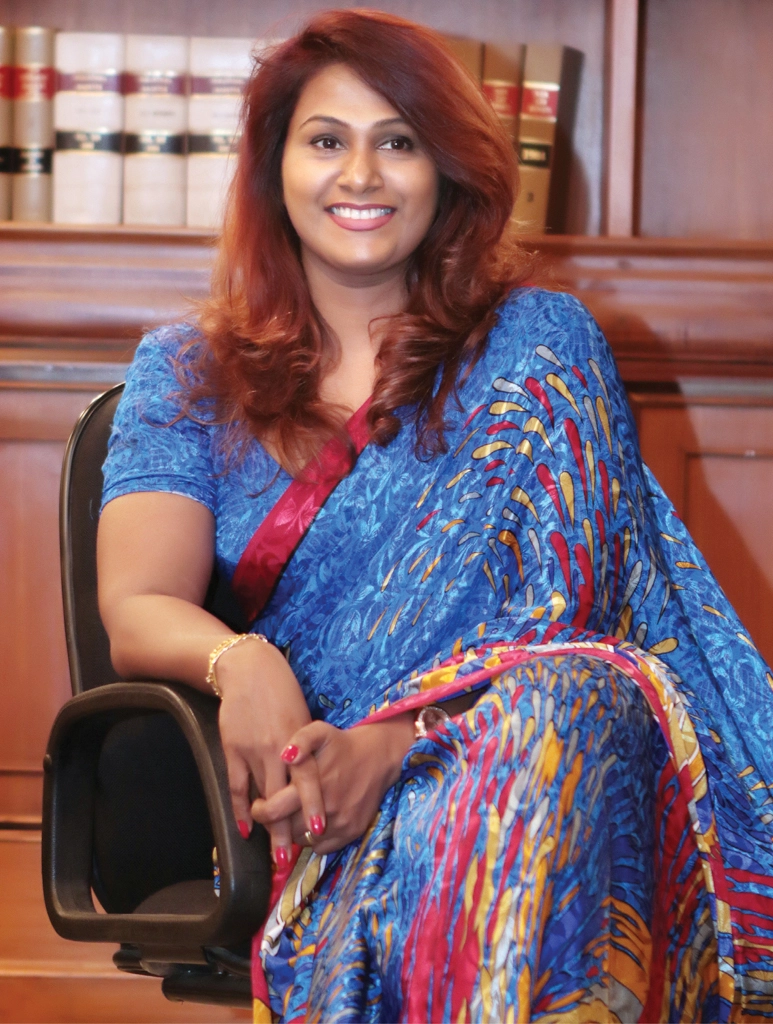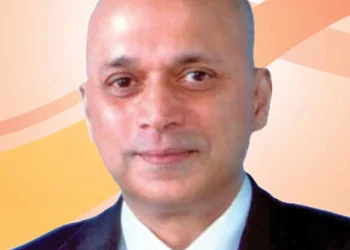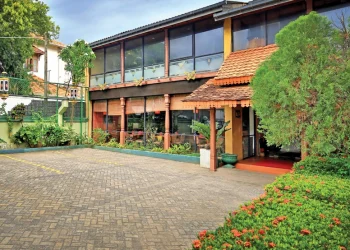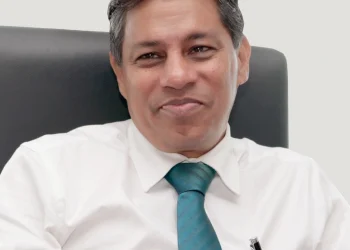
Over two decades, Chethana Liyanage was a familiar face across Sri Lanka. A news anchor, who has witnessed the emergence of news broadcasting in private media, she has witnessed the transformation of the industry. From reporting during the conflict and in the aftermath of the 2004 Tsunami, she relates experiences never spoken about before in her book ‘Nokiyu Pravurthi’ launched recently. It is a publication that took three years, and she hopes will be a guide to newcomers to the industry as well as an inspiration to others.
By Keshini de Silva
Photography Mahesh Bandara and Menaka Aravinda
You recently launched your memoir ‘Nokiyu Pravurthi’. Could you tell us about the book?
The book is about my career as a news anchor, as I presented news on television for 20 years. It follows my professional journey and through my experiences offers guidelines to youngsters who want to join the industry as news anchors.
It is a new form of narration, which I hope will be an unconventional experience for readers. Initially, I had thought of writing a book about news reading, but eventually decided to tell the story through my personal experiences, or else it would have been too boring due to the technicality of the subject and a wider readership would not be able to relate to it. In terms of experiences, I have much to share, especially during my experience as a news anchor, touching on the challenges that I had to face. I thought that would add some value to the work as well. To be honest, I have never read a book about news anchoring, and I felt that I myself would like to read something, which documents the personal experiences of someone who had been a news anchor for decades. Or else, the book would have merely been about guidelines about posing in front of the camera and reading styles.
The Book Is About My Career As A News Anchor…It Follows My Professional Journey And Through My Experiences Offers Guidelines To Youngsters Who Want To Join The Industry
Nokiyu Pravurthi starts with my childhood experiences with my father, Gunadasa Liyanage, also known as Guli, who was a journalist in the country. Therefore, my siblings and I grew up in a background linked to news, although I did not realise this at the time. When we were very young, I used to wonder about the things my father did, as well as about the chaos that ensued in the house after a tragic incident that occurred, especially in relation to the war. Later on, when I joined the news industry, I was able to look back and relate to my childhood experiences. Gradually, the novel progresses to my time at school, my extra-curricular activities including news reading, how I improved myself, subsequently applied for a position as a news anchor on TNL and from there onwards the launch of my career at MTV.
During the narration of my experiences as a news anchor, there are guidelines provided for youngsters entering the field. The book concludes with notes on the prevalent situation in the country. The industry has evolved during the last two decades and news anchoring has become an accepted established career. There are many award ceremonies to recognise this career today. Parents want their children to become news presenters overnight to embrace the glamour, however they do not understand the dedication or evaluate the places at which their child should study this subject. Therefore, it is something that I have spoken about by also criticising the misinformation that is provided on this field.
Over the span of two decades, does the book touch on the transformation of news anchoring in Sri Lanka?
Yes, it touches on the transformation of the industry as well. Especially, in terms of the entrance and emergence of news broadcasting in private media. Because this is not something that has been written about. At the time I joined, news was predominantly dominated by state television, which had a traditional outlook. Female anchors wore handloom sarees and hair buns. However, when I started to work at MTV there was almost a revolution taking place. As I was reading all five days of the week, my screen test was done in five different ways, with five different hairstyles and outfits. It was a novel experience for me and the reading style was different as well. Indeed, appearing on television, consecutively on five days of the week was a challenge, because you have to improve yourself and make a great effort in your outward appearance. That was a challenge and I have written about that. It was a learning curve for me, as a school leaver. Television make-up is different to beauty make-up, it depends on the lights, screen and backdrop. From the way you wear your saree jacket to your posture, everything is prominent. I learnt these skills on the job, by myself. Eventually, I believe it added value to what we did. After all, when you do your own make-up you feel very comfortable
When I Started To Work At MTV There Was Almost A Revolution Taking Place. As I Was Reading All Five Days Of The Week, My Screen Test Was Done In Five Different Ways, With Five Different Hairstyles And Outfits. It Was A Novel Experience For Me And The Reading Style Was Different As Well.
At MTV, we do not merely present news, you must report on the field as well. Someone doesn’t merely give you scripts to read, that is not news anchoring. You have to go to the field and be with the public. It is not an eight-hour job, when you become a reporter the dedication is beyond standard working hours. I would be at the Faculty of Management at the University of Colombo for lectures in the morning, then head to office to leave for coverage either out of Colombo or at Parliament, and then I would return to office, to do my make-up and present news. News reporting is quite challenging. You cannot dictate where you want to go, or whether you can work at night or not. Depending on the situation, and the coverage assigned, you have to do it. Most of the time, we ensure there are no concerns and ensure safety before assigning reporters, especially females, for late night coverage. But when you become a news anchor, you have to be ready to experience all aspects of work.
I have reported on the field in the aftermath of the Central Bank bombing and 2004 Tsunami, and I have shared these experiences in terms of their challenges as well as emotional impact on a reporter. In fact, I was assigned to report on the Central Bank bombing in 1996 by chance, because I was already on the field interviewing Ms Nanda Malini for a segment called Sameepa Dasuna. During filming, we got a call from head office to go to National Hospital in Colombo to cover the situation live from there. I was wearing heavy make-up and a colourful jacket, which was not suited for crisis reporting, but I could not do anything. It was a sad and harrowing situation and was the first time that I had witnessed a calamity of that magnitude. We were on the field the entire day.
In 2004, a few days after the Tsunami struck we went to Jaffna, Trincomalee and Matara on a charter flight by the Indian Army. There were many journalists with us. It was a very reflective experience and was not ordinary reporting. When we interviewed people in camps, they could hardly speak to us. This was not arranged; it was a totally different experience. You become sensitive and sometimes it is difficult to prepare yourself for that emotional impact. Sometimes, you decide that visuals speak louder and better than a narration or interview.
As a news reader you need to think on your feet and I have written about my experiences, in the hope that it will help new reporters. For example, if the lights in the studio suddenly go off, but the mics are on, what do you do? Do you try to keep reading the news or do you say something else? Because you are still on air and the mics are on. The guidance and assistance given by Chairman of The Capital Maharaja Organisation, Mr R Rajamahendran must be mentioned as he always sets higher standards and encourages us towards continuous improvement.
What about public attention, how did you manage this aspect?
Yes, in the book I touch on this as well. As I appeared on television on all five days of the week for ten consecutive years, and as at the time there were not as many television channels in Sri Lanka, I had, I suppose, a huge fan base. With this type of popularity, there are advantages and disadvantages.
During My 20 Years Of Presenting, I Did Not Do Any Segment Unrelated To News; I Have Not Even Voiced A Commercial. I Was A News Anchor And That Was The Identification That I Received.
In early 2000, I went to the visa office to apply for a visit visa to the UK. At the time, the counters were not private, everyone could see and possibly hear the conversations with the visa officer. Due to the war and terrorism, many visas were being rejected as well. When I walked in with my mother, many people in the waiting line recognised me and came up to me and spoke to me. At that time, I felt conscious of everything and told my mother that I did not want to visit the UK and speak to the visa officer and get rejected in public. However, I went with my mother and did not even look at the visa officer. Eventually, he issued the visa to me and then said, “So MTV will stop airing news until you come back from your visit?”. I was shocked and surprised when the British Visa Officer said he was a fan, and obviously happy that I was granted the visa. Therefore, popularity is a tricky thing, especially for news readers. It’s not being an actress or a celebrity.
One of the primary aims behind my book was to offer some guidance to news anchors. Nowadays many young people want to become news anchors, but they only think about the fame or popularity. Of all television presenters, news anchors are very prominent and they become the identity of the channel. Therefore, the exposure you get by being a news anchor is quite different. In my book I have mentioned how, credibility is important to news anchors. If you are present on every entertainment programme on the channel, you will lose credibility. During my 20 years of presenting, I did not do any segment unrelated to news; I have not even voiced a commercial. I was a news anchor and that was the identification that I received. As news readers are the identity of the channel, I wanted to maintain that as well. Of course you can do programmes such as segments on current affairs, which are related to news. But if you deviate to present other entertainment programmes, you lose your credibility.
On balancing work, family and time?
It’s a challenge, especially for any female. Presently, I am Director of Talent Management at Maharaja Group and the responsibilities are high. Even my husband holds a senior position at a public quoted company and thus both of us are not merely confined for an eight hour job. When it comes to family life, I have to look into the needs of my children; I have two daughters Chavi Lithya and Ruvi Charya Gunawardena. I wake up early in the morning and so am able to plan out my day. This is something that I learnt from my mother, who used to make a to-do list and by the time I woke up at four in the morning, I saw that she had already completed some tasks. This has been a source of motivation throughout my life.
When it comes to balancing life, whether you are a female or a male, you must be focused. Then you will see the results.
What motivated you to write this memoir? Could you tell us about the process?
My parents were authors: my father was a journalist and my mother was a lecturer, and both of them authored many publications. When I was younger, I wanted to become a newspaper journalist. However, as an experienced news anchor, when I started lecturing on news anchoring, many told me that I should write a book documenting all my experiences. They found what I had to say to be interesting. That’s where I got the idea, and it was a challenge, but at first I just started to take notes and jot down experiences and thoughts that I would add to the book.
I Received Good And Positive Feedback For The Book, Especially In Terms Of The Writing Style… Many Told Me They Can Read The Book Effortlessly. I Also Received Compliments On How It Was Interesting To Read.
I had seen the efforts my mother and father put into publishing their work, however it was a difficult task. It was also a learning process, which I believe will help me in the future.
Considering my official and personal commitments, at times I thought I might even give up writing the book. Thus, nearly the entire book was written from 1am to 5am, when everyone was asleep. But it was not planned, I wrote down all the thoughts when they came to me. Despite the challenges, I really enjoyed it. The printing and publishing of the book in itself was a huge challenge. There were many aspects that needed looking into, and I am grateful for the great help I received from my husband Laksanda Gunawardena.
Why did you select the title ‘Nokiyu Pravurthi’?
It means ‘Untold News’. Wherever I go, people associate me with news; after all I was in the industry for two decades. Currently I am in HR, and when I go for a function, corporate or otherwise, I find that I am still introduced or associated with news anchoring; for better or for worse. Therefore, I realised that news is something that I cannot obviously distance myself from. Whatever I have written about in the book, I have never discussed with anyone. Since everyone expects news from me, I decided on the name Nokiyu Pravurthi or Untold News.
You dedicated the book to your parents. Could you tell us about the family legacy in journalism and writing and its impact on you?
I am proud of that legacy. I did not realise the value of it when I was a child. When I joined the industry, many would approach me and speak to me about my father, and about how he was a fearless journalist. It was then that I realised how proud I was of both my parents.
What has been the feedback or reception for the book? Any specific quotes from readers?
I received good and positive feedback for the book, especially in terms of the writing style. Many told me they can read the book effortlessly. That is because of the simple Sinhala language I used. I also received compliments on how it was interesting to read. There were positive comments on the tips and guidelines from those who enter the industry.
Emeritus Professor J B Dissanayake, himself said it was very interesting and that he read it at a stretch. He encouraged me to write more. Sundara Nihathamani de Mel, Consultant Editor for Lakbima also complimented me on the writing style and encouraged me to write more and to focus on other topics of interest.
On the other hand, others who read the book said they wanted their children to read it as the book provides a message about expanding experiences for character building.
What about the future? Are you planning on releasing any translations?
Yes, but it will take some time. I spent more than three years writing this book and I do not know how long the translations will take. I also want to write on other aspects; there is a strong inclination within me to write something, but I haven’t figured out what message I want to send across. Within another five to six months I am planning on starting something.
The message you hope readers will take from your book?
To the newcomers my message is try not think about the popularity, news anchoring is a career. It takes years to become a professional news anchor. In my book I have detailed how I worked towards it from my days at school. I learnt through my own experiences. I watched all my bulletins the following day, that is the best way to learn. When you are out on the road, many will come up to you and say you were superb on air last night, or they would compliment your appearance and attire and then again others will also criticise you. The feedback is diverse. When you watch your own bulletin, you can identify and relate to the feedback; and you are after all your best critique. I specifically highlight this in the book, because I have witnessed how news anchors today will train and watch their news bulletins during the first few months. After that they assume they are professional news readers and do not require training. But you have to improve yourself and do your homework.
When I First Joined As A News Anchor, I Wanted To Be The Best, Not Just Another Anchor. When I Aim To Achieve Something I Work Hard Towards It. With Dedication, Preparation And Hard Work, I Saw Results.
In my 20 years as a news anchor and even now as an HR professional I always prepared ahead. Whether it’s a 30 minute or ten minute programme, I study and research the topic and person I would be interviewing. When the producer informs of an interview for the segment, you must study the issue being discussed and the person being interviewed, or else you will not be able to face the challenge.
I have also written about things that I did successfully and also unsuccessfully. Some get demotivated after they enter the industry considering the challenges and criticism. When they read the book, I hope they will realise that I too faced similar issues, but am where I am today, because I learnt to face those challenges and to overcome them. In fact, after reading the book, some who had seen me present during those initial years have said that they did not know what I was going through, and only realised after reading the book.
I hope everyone who reads the book will be able to enjoy and take something from it, after all it is an autobiography of sorts. Especially in terms of the things that I have done. I am now in HR and go through many CVs. I have witnessed that many focus only on paper qualifications, they have no other interests or any extra curricular participation. Once they join the workforce, most of the time, it is difficult to work with them as they are not team players.
My message to everyone is what I always say to youngsters when I meet them, “Always try to be the best.” When I first joined as a news anchor, I wanted to be the best, not just another anchor. When I aim to achieve something I work hard towards it. With dedication, preparation and hard work, I saw results.





